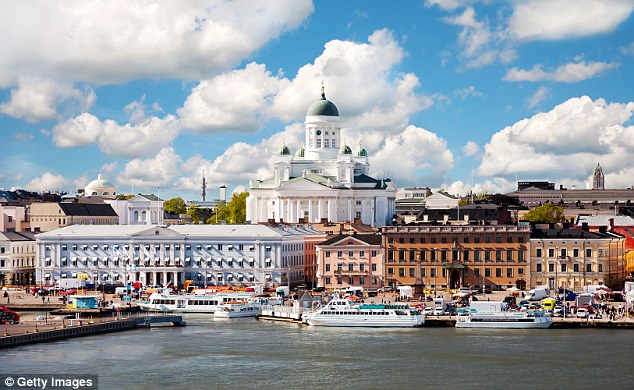Finland has been named the happiest country in the world, leading a top ten that includes a total of five Nordic nations.
The World Happiness Report, released today, ranked 156 countries by happiness levels, based on factors such as life expectancy, social support and corruption.
But while the Nordic countries of Finland, Norway, Denmark and Iceland topped the table, there was no place in the top ten for Britain, which was named 19th.
The UK was one place above the United Arab Emirates but behind the likes of Israel, Austria, Costa Rica, Ireland, Germany, Belgium and Luxembourg.
The African nation of Burundi was at the bottom of the happiness index which found America, at 18th, was getting less happy even as the country became richer.

Unlike past years, the annual report published by the U.N. Sustainable Development Solutions Network also evaluated 117 countries by the happiness and well-being of their immigrants.
Europe’s Nordic nations, none particularly diverse, have dominated the index since it first was produced in 2012. In reaching number one, Finland nudged neighbouring Norway into second place, scoring 7.632 in the 0 to ten scale.
Rounding out the top ten are Denmark, Iceland, Switzerland, Netherlands, Canada, New Zealand, Sweden and Australia. The United States fell to 18th place from 14th last year.
Propping up the table was the African nation of Burundi, with a score of just 2.905. The bottom ten also included Central African Republic, South Sudan, Tanzania, Yemen, Rwanda, Syria, Liberia, Haiti and Malawi.
Meanwhile Russia was 59th, France 23rd and China 86th.
Relatively homogenous Finland has about 300,000 foreigners and residents with foreign roots, out of its 5.5 million people.
Its largest immigrant groups come from other European nations, but there also are communities from Afghanistan, China, Iraq and Somalia.
John Helliwell, a co-editor of the World Happiness Report and professor emeritus of economics at the University of British Columbia, noted all the top ten nations scored highest in overall happiness and the happiness of immigrants. He said a society’s happiness seems contagious.



‘The most striking finding of the report is the remarkable consistency between the happiness of immigrants and the locally born,’ Helliwell said. ‘Those who move to happier countries gain, while those who move to less happy countries lose.’
Meik Wiking, CEO of the Copenhagen-based Happiness Research Institute, said the five Nordic countries that reliably rank high in the index ‘are doing something right in terms of creating good conditions for good lives,’ something newcomers have noticed.
He said the happiness revealed in the survey derives from healthy amounts of both personal freedom and social security that outweigh residents having to pay ‘some of the highest taxes in the world.’
‘Briefly put, (Nordic countries) are good at converting wealth into well-being,’ Wiking said. The finding on the happiness of immigrants ‘shows the conditions that we live under matter greatly to our quality of life, that happiness is not only a matter of choice.’
Four different countries have held top spot in the four most recent reports- Denmark, Switzerland, Norway and now Finland.

All the top countries tend to have high values for all six of the key variables that have been found to support well-being: income, healthy life expectancy, social support, freedom, trust and generosity.
An analysis of happiness changes from 2008-2010 to 2015-2015 shows Togo as the biggest gainer, moving up 17 places in the overall rankings from the last place position it held as recently as in the 2015 rankings.
The biggest loser is Venezuela, down 2.2 points on the 0 to 10 scale.
The United States was 11th in the first index and has never been in the top ten. To explain its fall to 18th, the report’s authors cited several factors.
‘The U.S. is in the midst of a complex and worsening public health crisis, involving epidemics of obesity, opioid addiction, and major depressive disorder that are all remarkable by global standards,’ the report said.
It added that the ‘sociopolitical system’ in the United States produces more income inequality – a major contributing factor to unhappiness – than other countries with comparatively high incomes.
The United States also has seen declining ‘trust, generosity and social support, and those are some of the factors that explain why some countries are happier than others,’ Wiking said.












